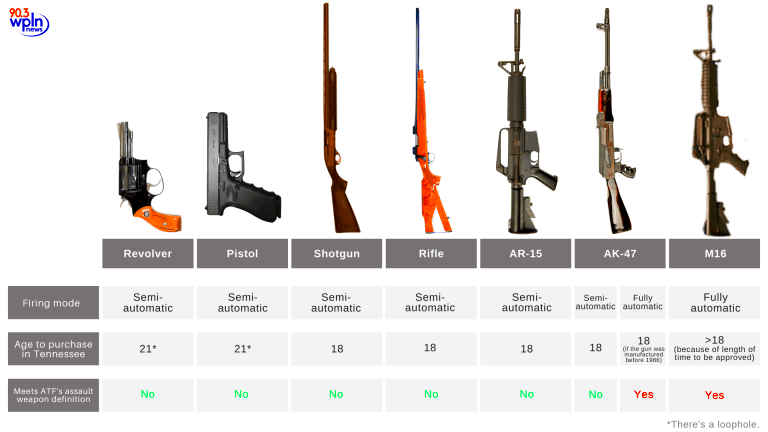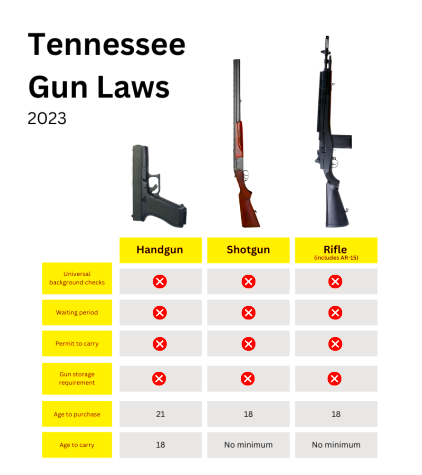Overview of Tennessee Gun Laws
Tennessee has a rich history of gun ownership and is known for its relatively permissive gun laws. The state’s laws balance the rights of responsible gun owners with the need for safety. Understanding these laws is crucial for both residents and visitors. This overview will cover the types of firearms allowed, permits for carrying firearms, and much more to ensure you’re well-informed.
Types of Firearms Allowed in Tennessee

Tennessee allows a wide range of firearms for personal use. Here’s a quick breakdown of the types of firearms you can own:
- Handguns: Includes revolvers and semi-automatic pistols.
- Rifles: Both bolt-action and semi-automatic rifles are permitted.
- Shotguns: Pump-action and semi-automatic shotguns are allowed.
- Assault Weapons: While there are no specific bans, some restrictions may apply.
It’s important to remember that all firearms must be purchased legally, and you should keep up-to-date with any changes in the law regarding firearm classifications.
Permits for Carrying Firearms
In Tennessee, there are specific requirements for obtaining a permit to carry firearms. Here’s what you need to know:
- Types of Permits:
- Concealed Carry Permit: Required for carrying a concealed handgun.
- Open Carry: Allowed without a permit for those who are 18 years or older.
- Eligibility Requirements:
- Must be at least 21 years old (or 18 if military).
- Must be a U.S. citizen or legal resident.
- Must not have a felony conviction.
- Must pass a background check.
- Application Process:
- Complete a training course.
- Submit an application to the Department of Safety.
- Pay the application fee.
Having a permit allows you to carry your firearm legally, but always stay informed about where you can and cannot carry.
Open Carry Laws in Tennessee
Open carry in Tennessee is generally allowed for those who are 18 years and older, as long as the firearm is in plain sight. This means you can carry your firearm in a holster or sling without needing a permit. However, there are some key points to keep in mind:
- Where You Can Open Carry:
- Public spaces such as parks and streets.
- Shopping centers and businesses, unless prohibited by the owner.
- Where You Cannot Open Carry:
- Government buildings and schools.
- Private property where firearms are prohibited.
- Establishments serving alcohol, unless you are not consuming alcohol.
- Local Restrictions: Some cities or counties may have their own regulations, so it’s essential to check local laws before carrying openly.
While open carry is legal, it’s wise to be aware of how it may be perceived by the public. Carrying openly can sometimes attract attention or concern, so always be respectful and responsible.
Concealed Carry Laws in Tennessee
Concealed carry laws in Tennessee provide residents with the option to carry firearms discreetly. To legally carry a concealed handgun, you need a permit. Here’s a closer look at the laws:
- Eligibility Requirements:
- Must be at least 21 years old (or 18 if you are active military).
- Must complete a background check.
- Must have completed a state-approved handgun training course.
- Obtaining a Permit:
- Complete a training course, which typically covers firearm safety and laws.
- Fill out an application form and submit it to the Department of Safety.
- Pay the required fee (around $100).
- Wait for your application to be processed, which usually takes a few weeks.
- Where You Can Carry:
- Most public places, such as stores and parks.
- Private property where you have permission.
- Where You Cannot Carry:
- Government buildings and schools.
- Places of worship, unless allowed by the property owner.
- Establishments that serve alcohol.
Carrying a concealed weapon comes with significant responsibility. Always ensure you’re aware of the laws and respect the rights of others.
Gun Ownership Rights and Responsibilities
Gun ownership in Tennessee comes with both rights and responsibilities that every gun owner should understand. Knowing your rights is crucial, but so is being a responsible owner. Here’s a breakdown:
- Rights of Gun Owners:
- The right to purchase and own firearms legally.
- The right to carry firearms openly or concealed, as allowed by law.
- The right to use firearms for self-defense, hunting, and sport.
- Responsibilities of Gun Owners:
- Ensure safe storage of firearms to prevent unauthorized access.
- Educate yourself and others about safe handling and usage of firearms.
- Stay informed about local, state, and federal gun laws.
- Report lost or stolen firearms to law enforcement promptly.
- Legal Consequences:
- Violating gun laws can lead to severe penalties, including fines and imprisonment.
- Felony convictions can result in the loss of gun ownership rights.
Owning a gun is a privilege that comes with serious responsibilities. By following the law and practicing safe habits, you can help ensure a safer environment for everyone.
Pennsylvania Gun Law Penalties
In Pennsylvania, understanding the penalties related to gun laws is crucial for anyone who owns or carries firearms. The laws can be strict, and violations can lead to serious consequences. Here’s a closer look at the types of penalties you might face:
- Types of Violations:
- Unlicensed Carrying: Carrying a firearm without a proper permit can result in a misdemeanor charge, with penalties including fines and potential jail time.
- Illegal Sale of Firearms: Selling firearms without a license is a felony, which can lead to significant fines and imprisonment.
- Possession of a Firearm by a Prohibited Person: If you have a felony conviction or other disqualifying factors, possessing a firearm can lead to felony charges and lengthy prison sentences.
- Penalties Overview:
Violation Type Penalty Unlicensed Carry Misdemeanor Up to 5 years in prison and fines up to $10,000 Illegal Sale Felony Up to 7 years in prison and fines up to $15,000 Prohibited Possession Felony Up to 10 years in prison and fines up to $25,000 - Defense Options: If you face charges, it’s important to know that there are legal defenses available. Consulting with an attorney who specializes in gun laws can help you understand your options and rights.
Always be aware of your responsibilities as a gun owner in Pennsylvania to avoid these penalties. Staying informed is key to ensuring that you are compliant with the law.
Frequently Asked Questions
Many people have questions about Tennessee gun laws, especially those who are new to owning firearms or are considering carrying. Here are some common queries:
- Do I need a permit to own a firearm in Tennessee?No, you do not need a permit to own a firearm in Tennessee. However, a permit is required to carry a handgun.
- Can I carry my gun in my vehicle?Yes, you can carry a firearm in your vehicle without a permit, but it must be stored safely and securely.
- What should I do if I am stopped by law enforcement while carrying?It’s best to inform the officer that you are carrying a firearm and follow their instructions. Keeping your hands visible can help ensure safety.
- Are there background checks for private sales?No, Tennessee does not require background checks for private sales, but it’s always wise to check the person’s background to ensure safety.
- What are the penalties for violating gun laws in Tennessee?Penalties can range from fines to imprisonment, depending on the severity of the violation. Always comply with local laws to avoid these penalties.
If you have more questions, it’s a good idea to consult with legal experts or local law enforcement for clarity.
Conclusion on Tennessee Gun Laws
Tennessee gun laws aim to balance the rights of gun owners with the need for public safety. Whether you’re a resident or a visitor, understanding these laws is essential for responsible gun ownership. Key takeaways include:
- Familiarize yourself with the types of firearms you can own and the laws surrounding them.
- Know the requirements for obtaining permits for concealed and open carry.
- Be aware of your rights and responsibilities as a gun owner.
- Stay informed about any changes in laws that may affect you.
By being knowledgeable and responsible, you can ensure a safer environment for yourself and those around you. Always prioritize safety, and consult legal resources if you have questions about the laws.


